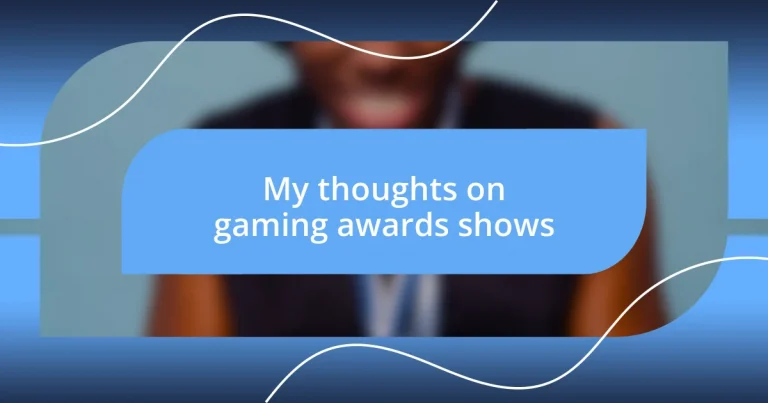Key takeaways:
- Gaming awards celebrate creativity and innovation, recognizing outstanding achievements and fostering community engagement among players and developers.
- The awards can influence industry trends, inspire indie developers, and spotlight emerging themes, ultimately impacting the direction of game development.
- Critiques include predictability in formats, an excessive focus on popular titles over indie games, and the overshadowing of genuine developers by celebrity appearances.
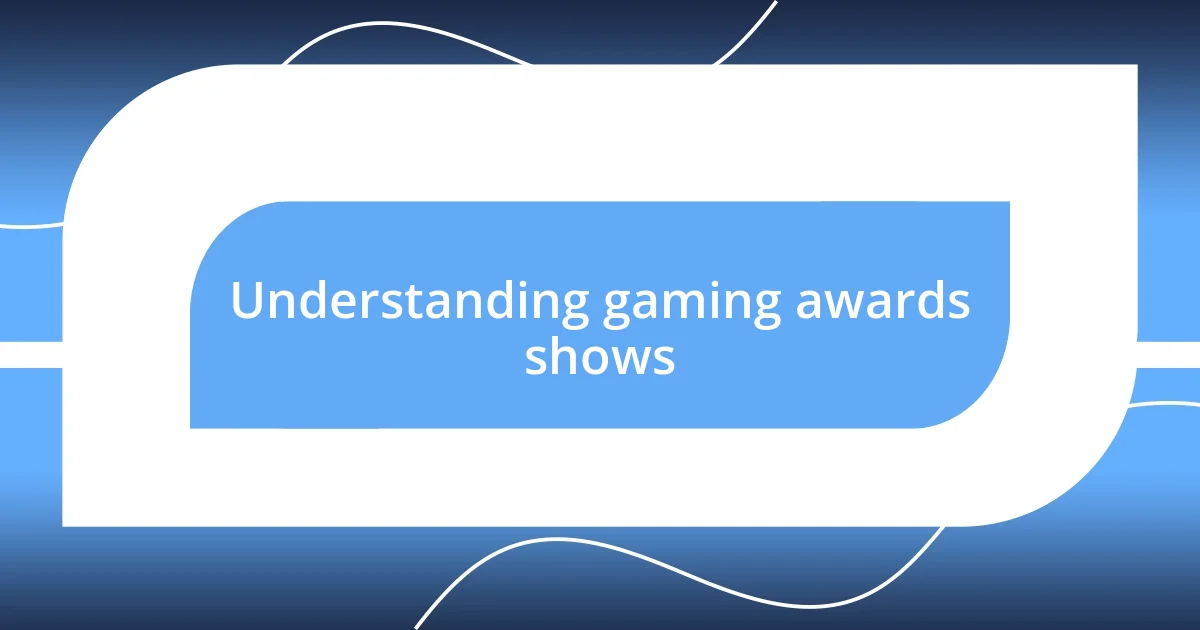
Understanding gaming awards shows
Gaming awards shows serve as a celebration of creativity and innovation in the industry. I remember the excitement I felt watching my favorite games nominated for prestigious awards. There’s something truly special about witnessing developers’ hard work being recognized, don’t you think?
Understanding the structure of these awards can be fascinating. They often feature various categories, like Best Art Direction or Game of the Year, which highlight the diverse aspects of game development. It’s like a spotlight on all the intricate puzzle pieces that come together to create a gaming masterpiece.
What intrigues me the most is the impact of fan voting in some shows. Have you ever cast your vote for your favorite game? I found it thrilling to feel like I had a say in the outcome, knowing that my preference could potentially influence the recognition of a game that brought me joy. These elements add a layer of community engagement that can be quite powerful.
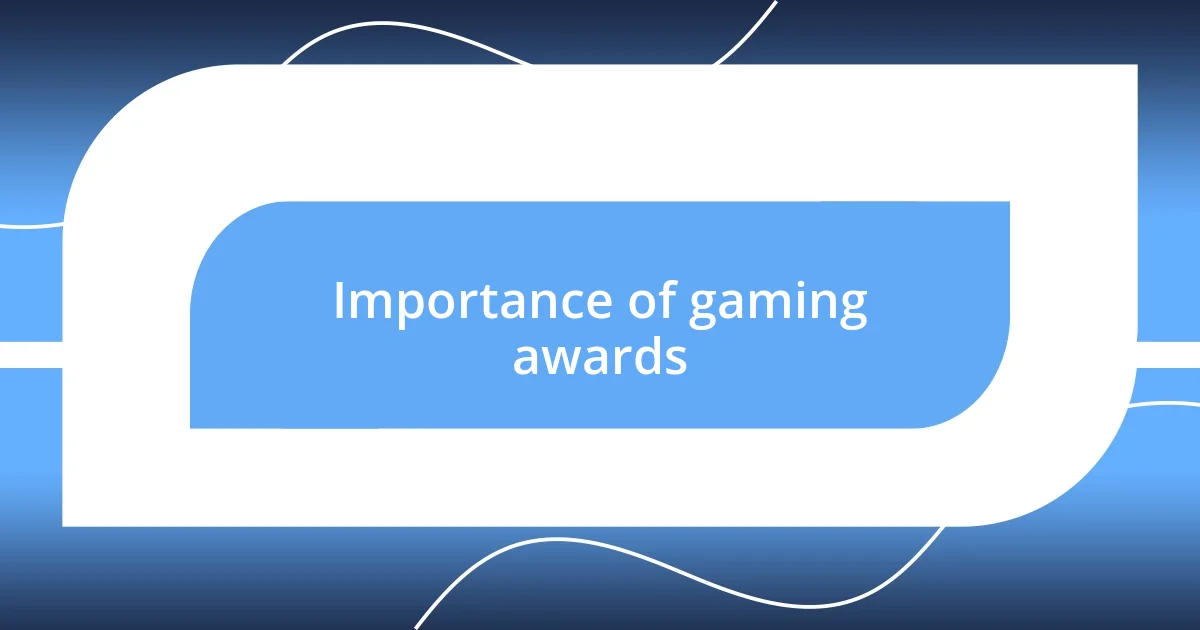
Importance of gaming awards
Gaming awards carry significant weight in our community. They shine a light on exceptional talent and creativity, offering developers validation for their hard work. I still remember the thrill when an underdog title took home an award, proving that passion can indeed triumph over more prominent competitors. It’s moments like these that make you feel part of something much bigger.
Here’s why gaming awards matter:
- Recognition: They honor outstanding achievements and encourage developers to push boundaries.
- Motivation: Awards can inspire indie developers to pursue their dreams, knowing that their efforts can lead to acknowledgment.
- Community Connection: They foster a sense of belonging among gamers, who come together to celebrate their favorite titles.
- Industry Trends: Awards highlight emerging trends, influencing what types of games might thrive in the coming years.
Witnessing this blend of passion, talent, and community at gaming awards events always leaves me feeling hopeful about the future of gaming.
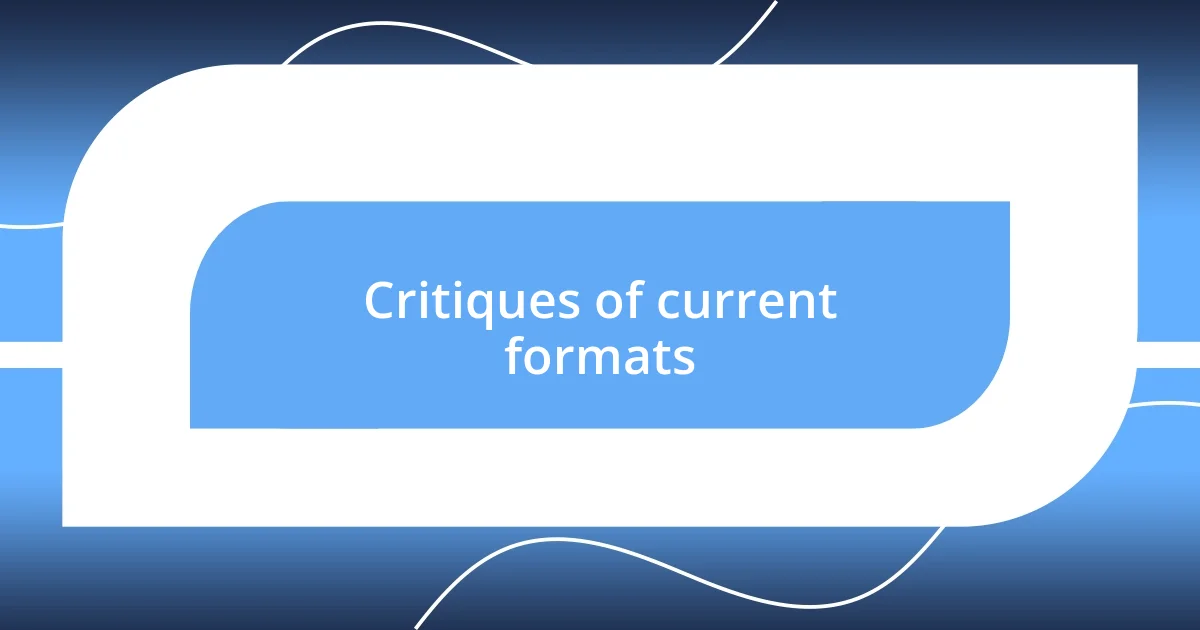
Critiques of current formats
Many gaming awards shows have a tendency to follow a predictable format, which can sometimes detract from the excitement. I recall watching a ceremony where the pacing felt lethargic, with long segments that seemed to drag on. It made me wonder if the creativity we see in games could be more accurately reflected in the shows themselves. Engaging presentations with unexpected twists can certainly elevate the experience, right?
Another critique I have is the excessive focus on popular titles, often overshadowing deserving indie games. After attending last year’s award show, I felt disappointed that smaller studios didn’t get the recognition they deserved. If you’ve ever played a game from an indie developer that moved you, you know how frustrating it can be to see their efforts go unnoticed. Celebrating diversity in gaming should be a priority, as it enriches our gaming landscape.
Lastly, the reliance on celebrity appearances often seems forced and distracts from the heart of the event. I’ve noticed moments where the spotlight shifted from the games to stars who seemed unfamiliar with the medium, which felt out of place. If only the focus could return to the developers who invest countless hours crafting these experiences for us, wouldn’t that be refreshing?
| Critique | Observation |
|---|---|
| Predictability | Formats often lack creativity, leading to a dull experience. |
| Focus on Popularity | Indie titles struggle for visibility in favor of mainstream games. |
| Celebrities | Celebrity appearances sometimes overshadow genuine developers’ contributions. |

Highlights from major shows
Some standout highlights from major gaming award shows stay etched in my memory. I’ll never forget the excitement shared by the team behind “Hades” when they swept multiple awards at the Game Awards. Seeing that kind of passion recognized truly resonated with me. It demonstrated how innovative storytelling and gameplay can captivate both audiences and critics alike.
At the BAFTA Games Awards, I was thrilled to see “Outer Wilds” get the acknowledgment it deserved. The atmosphere in the room was electric, and you could feel the shared love for the game’s unique exploration mechanics. It made me think about how important it is to honor not just graphics and sales but genuine creativity that pushes boundaries. How often do we celebrate those game designs that leave a lasting impact?
Additionally, witnessing the emotional acceptance speech from the creators of “Celeste” sparked a reflection on the importance of mental health in gaming. Their heartfelt words about representing real struggles reminded me of how games can serve as a safe haven and dialogue starter. Isn’t it amazing to see developers connect on such a personal level during these moments? It’s these highlights that truly showcase the heart and soul within the gaming community.
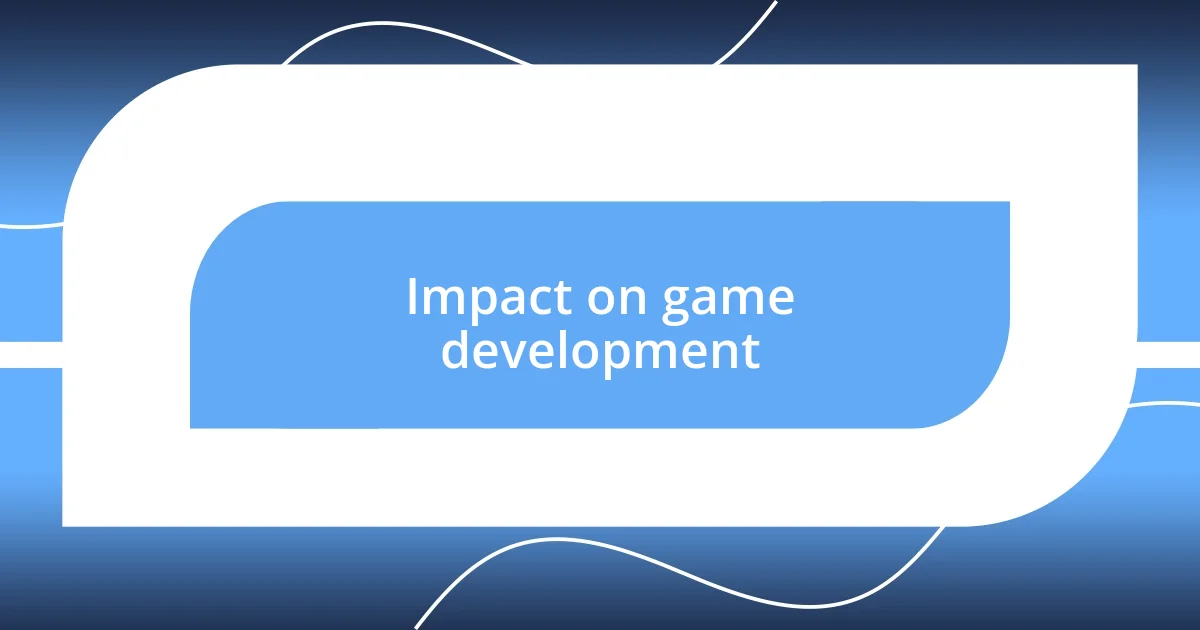
Impact on game development
The gaming awards shows can have a profound impact on game development, often influencing the direction studios take in their projects. I remember the buzz around a particular award-winning game that inspired countless developers to explore similar innovative narratives. It’s interesting how recognition can become a roadmap for creativity, propelling studios to push boundaries that they might have hesitated to cross otherwise.
One thing that strikes me is how these awards can spotlight emerging trends in gaming. For instance, after a few titles that focused on mental health received accolades, I noticed a shift in how many developers approached storylines. It was as if the awards sent a message: meaningful themes resonate. How wonderful is it to see the industry evolve in response to such recognition?
Additionally, the potential for funding often increases for titles that receive awards or nominations. I’ve seen indie studios jump from obscurity to securing more resources simply because their unique vision was applauded at one of these events. It reminds me that the cycle of recognition can provide not just glory but tangible support, encouraging developers to take risks and innovate in ways they might not have dared before.
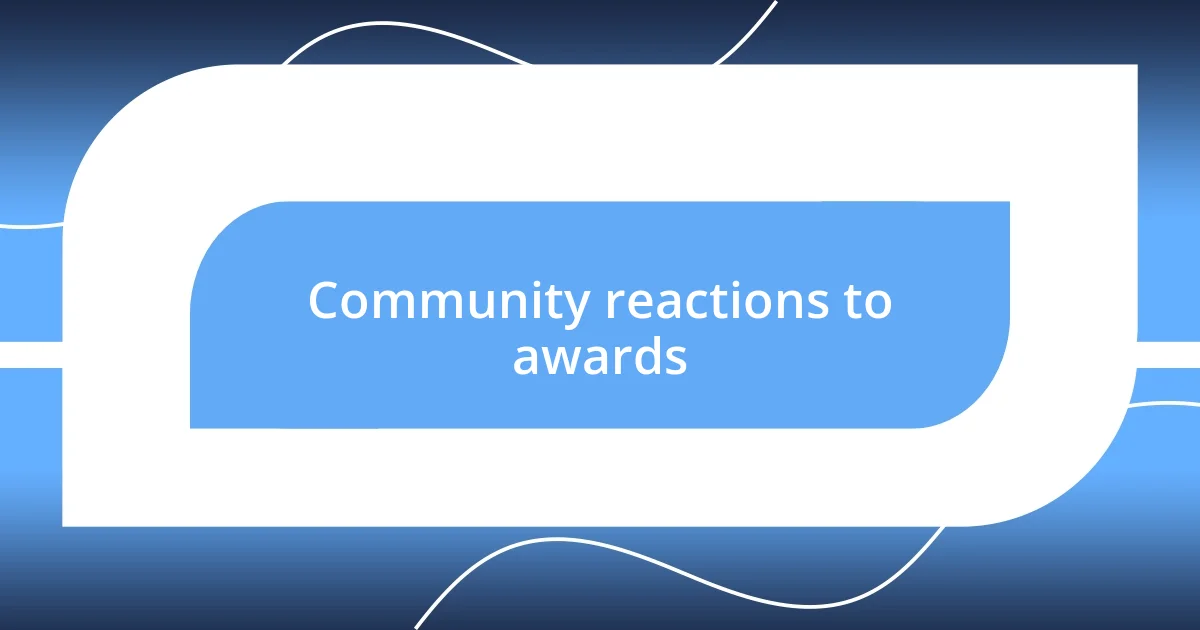
Community reactions to awards
The reactions from the gaming community during awards shows can be quite passionate, showing just how invested people are in the industry. I recall watching a live stream when a smaller game pulled off a surprise win for Game of the Year. The chat exploded with cheers, memes, and even heartfelt messages from players who felt seen by this achievement. It struck me how much these moments can unite fans, creating a sense of shared joy that transcends individual preferences.
But not all reactions are positive; disappointment can also run deep. I’ve seen heated discussions erupt online when a beloved title fails to secure an expected award. These conversations reveal what we truly value: community engagement, meaningful stories, and, sometimes, the injustice we perceive in the awards process. It makes me wonder—how much weight do we give to these awards in defining a game’s legacy? For many, it’s a true reflection of their personal experiences and investment.
Ultimately, the emotional rollercoaster of awards shows mirrors the highs and lows of gaming itself. I remember participating in a Twitter thread after the nominations were announced, debating about overlooked titles and expressing excitement for the ones that made the cut. This kind of interaction highlights the unique relationship gamers have with the awards: they aren’t just a celebration of achievement but also a platform for discussion, critique, and connection. It brings us together to champion the games that resonate deeply with our experiences.
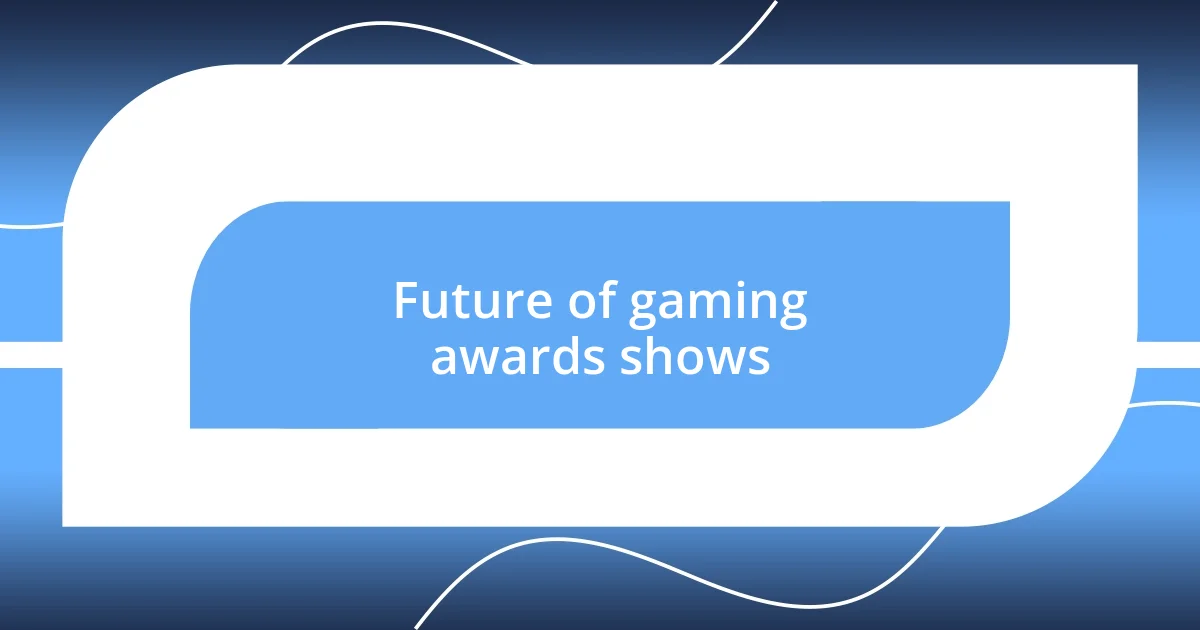
Future of gaming awards shows
As I think about the future of gaming awards shows, I can’t help but feel excited about the potential for inclusivity. Imagine a world where voices from diverse gaming communities are heard and celebrated. I remember the time I attended a smaller awards ceremony that focused on indie developers. The atmosphere was electric, brimming with passion and ideas that mainstream shows often overlook. It made me realize how essential it is to broaden the scope of recognition in our industry.
Also, the integration of technology could shift the landscape significantly. With virtual reality and augmented reality continuing to evolve, it’s entirely possible we might see immersive award shows that allow fans to interact in real-time. I’ve often envisioned watching a live stream where viewers could ‘walk’ through nominees’ worlds, engaging with their environments. Wouldn’t it take the viewer experience to a whole new level? This kind of innovation could not only enhance engagement but also provide developers with instant feedback on the impact of their creations.
Then there’s the question of how award shows will continue to adapt to an ever-changing gaming landscape. As more games embrace unique monetization strategies, I sometimes wonder if traditional award categories will remain relevant. In my experience, seeing a successful free-to-play title earn recognition would challenge the idea of what constitutes “quality.” This evolution could lead to more nuanced criteria for judging games, fostering an environment where innovation and creativity address diverse player experiences. Isn’t it fascinating to consider how the future of awards could reshape our understanding of gaming itself?












